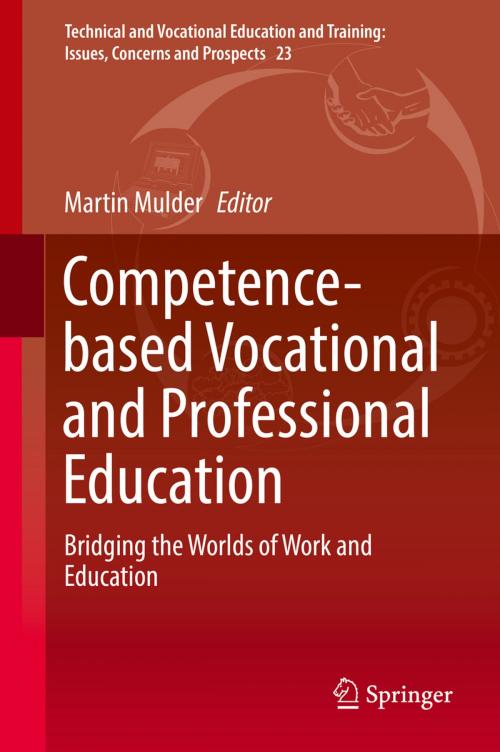Competence-based Vocational and Professional Education
Bridging the Worlds of Work and Education
Nonfiction, Reference & Language, Education & Teaching, Counseling & Guidance, Higher Education| Author: | ISBN: | 9783319417134 | |
| Publisher: | Springer International Publishing | Publication: | September 8, 2016 |
| Imprint: | Springer | Language: | English |
| Author: | |
| ISBN: | 9783319417134 |
| Publisher: | Springer International Publishing |
| Publication: | September 8, 2016 |
| Imprint: | Springer |
| Language: | English |
This book presents a comprehensive overview of extant literature on competence-based vocational and professional education since the introduction of the competence concept in the 1950s. To structure the fi eld, the book distinguishes between three approaches to defi ning competence, based on 1.functional behaviourism, 2. integrated occupationalism, and 3. situated professionalism. It also distinguishes between two ways of operationalizing competence: 1. behaviour-oriented generic, and 2. task-oriented specifi c competence. Lastly, it identifi es three kinds of competencies, related to: 1. specific activities, 2. known jobs, and 3. the unknown future. Competence for the unknown future must receive more attention, as our world is rapidly evolving and there are many ‘glocal’ challenges which call for innovation and a profound transformation of policies and practices. Th e book presents a range of diff erent approaches to competence-based education, and demonstrates that competencebased education is a worldwide innovation, which is institutionalized in various ways. It presents the major theories and policies, specifi c components of educational systems, such as recognition, accreditation, modelling and assessment, and developments in discipline-oriented and transversal competence domains. Th e book concludes by synthesizing the diff erent perspectives with the intention to contribute to further improving vocational and professional education policy and practice.
Joao Santos, Deputy Head of Unit C5, Vocational Training and Adult Education, Directorate General for Employment, Social Aff airs and Inclusion, European Commission:
“This comprehensive work on competence-based education led by Martin Mulder, provides an excellent and timely contribution to the current debate on a New Skills Agenda for Europe, and the challenge of bridging the employment and education and training worlds closer together. Th is book will infl uence our work aimed at improving the relevance of vocational education to support initial and continuing vocational education and training policy and practice aimed at strengthening the key competencies for the 21st century.”
Prof. Dr. Reinhold Weiss, Deputy President and Head of the Research, Federal Institute for Vocational Education and Training (BIBB), Bonn, Germany:
* “This book illustrates that the idea and concept of competence is not only a buzzword in educational debates but key to innovative pedagogical thinking as well as educational practice.”*
Prof. Dr. Johanna Lasonen, College of Education, University of South Florida, Tampa, USA:
"Competence-based Vocational and Professional Education is one of the most important multi-disciplinary book in education and training. Th is path-breaking book off ers a timely, rich and global perspective on the fi eld. Th e book is a good resource for practitioners, policymakers and researchers."
This book presents a comprehensive overview of extant literature on competence-based vocational and professional education since the introduction of the competence concept in the 1950s. To structure the fi eld, the book distinguishes between three approaches to defi ning competence, based on 1.functional behaviourism, 2. integrated occupationalism, and 3. situated professionalism. It also distinguishes between two ways of operationalizing competence: 1. behaviour-oriented generic, and 2. task-oriented specifi c competence. Lastly, it identifi es three kinds of competencies, related to: 1. specific activities, 2. known jobs, and 3. the unknown future. Competence for the unknown future must receive more attention, as our world is rapidly evolving and there are many ‘glocal’ challenges which call for innovation and a profound transformation of policies and practices. Th e book presents a range of diff erent approaches to competence-based education, and demonstrates that competencebased education is a worldwide innovation, which is institutionalized in various ways. It presents the major theories and policies, specifi c components of educational systems, such as recognition, accreditation, modelling and assessment, and developments in discipline-oriented and transversal competence domains. Th e book concludes by synthesizing the diff erent perspectives with the intention to contribute to further improving vocational and professional education policy and practice.
Joao Santos, Deputy Head of Unit C5, Vocational Training and Adult Education, Directorate General for Employment, Social Aff airs and Inclusion, European Commission:
“This comprehensive work on competence-based education led by Martin Mulder, provides an excellent and timely contribution to the current debate on a New Skills Agenda for Europe, and the challenge of bridging the employment and education and training worlds closer together. Th is book will infl uence our work aimed at improving the relevance of vocational education to support initial and continuing vocational education and training policy and practice aimed at strengthening the key competencies for the 21st century.”
Prof. Dr. Reinhold Weiss, Deputy President and Head of the Research, Federal Institute for Vocational Education and Training (BIBB), Bonn, Germany:
* “This book illustrates that the idea and concept of competence is not only a buzzword in educational debates but key to innovative pedagogical thinking as well as educational practice.”*
Prof. Dr. Johanna Lasonen, College of Education, University of South Florida, Tampa, USA:
"Competence-based Vocational and Professional Education is one of the most important multi-disciplinary book in education and training. Th is path-breaking book off ers a timely, rich and global perspective on the fi eld. Th e book is a good resource for practitioners, policymakers and researchers."















